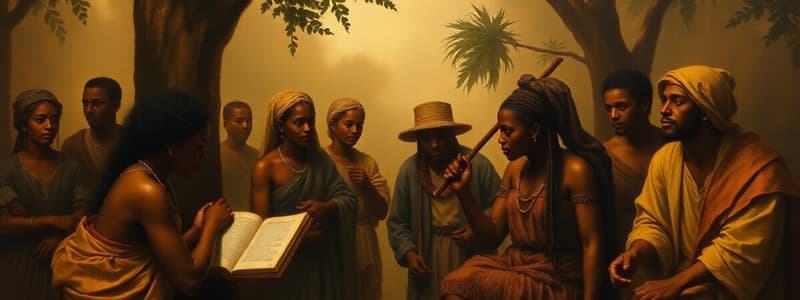Podcast
Questions and Answers
What primary foundation did slavery provide for Southern culture?
What primary foundation did slavery provide for Southern culture?
- A distinct legal system
- A coherent and religiously grounded world view (correct)
- A focus on political independence
- Economic prosperity
How did Southern theologians view their participation in the culture they were part of?
How did Southern theologians view their participation in the culture they were part of?
- They viewed it as an active participation that shaped their beliefs. (correct)
- They considered it a necessary evil for community cohesion.
- They saw it as purely a financial obligation.
- They believed it was only for social status.
What challenge did Southern theologians, particularly Evangelicals, face regarding their faith?
What challenge did Southern theologians, particularly Evangelicals, face regarding their faith?
- Reconciliation with modern scientific views
- Addressing the egalitarian claims of Christianity (correct)
- Adapting to urbanization and industrialization
- Maintaining traditional family structures
Which tradition did the Catholic Church and Protestantism develop regarding slavery?
Which tradition did the Catholic Church and Protestantism develop regarding slavery?
What characterization of Southern religious leaders does the content challenge?
What characterization of Southern religious leaders does the content challenge?
Flashcards
Foundation of Southern culture
Foundation of Southern culture
Slavery provided a coherent, religiously grounded worldview for the South.
Southern theologians' view
Southern theologians' view
Southern theologians actively shaped their beliefs by participating in Southern culture.
Evangelical challenge
Evangelical challenge
Southern Evangelical theologians struggled to reconcile their faith with egalitarian ideals in Christianity.
Church tradition on slavery
Church tradition on slavery
Signup and view all the flashcards
Southern religious leaders
Southern religious leaders
Signup and view all the flashcards
Religious worldview in South
Religious worldview in South
Signup and view all the flashcards
Religion and Authority
Religion and Authority
Signup and view all the flashcards
Egalitarianism in Christianity
Egalitarianism in Christianity
Signup and view all the flashcards
Theology and Society
Theology and Society
Signup and view all the flashcards
Southern Culture's Roots
Southern Culture's Roots
Signup and view all the flashcards
Study Notes
Religious Ideals of Southern Slave Society
- Southern slaveholders developed a coherent worldview based on religious values, linking them to nonslaveholders.
- Christianity's egalitarian principles were questioned by the South in relation to slavery.
- Justification for slavery was often found in separating God's concerns from earthly matters, particularly in the context of labor.
- Southern culture valued the household structure and a form of individualism that emphasized dependence within the family.
- This led to the view that labor outside of the household was disruptive, justifying the vast social and economic gaps in the South.
- This system created a "slaveholders' republic" where non-slaveholders, particularly yeomen, were potential slaveholders, accepting the dominance of slavery.
- The South defended slavery as a moral bulwark against chaos and societal upheaval, using Christianity as a foundation for its ideology.
- Southern society viewed abolitionists as heretics for questioning the Bible's potential justification of slavery, deepening divisions between North and South.
- Religion played a significant role in shaping the communities, providing education and moral guidance.
- Churches functioned as a unifying force, despite internal disputes, promoting a shared Christian consensus.
- Religion offered solace and self-control in a world filled with dangers, both physical and societal.
- Christianity justified the slaveholders' control over slaves as a Christian duty and right.
- Women were encouraged to accept their role within the household, supporting the existing power structure.
- The South promoted tolerance within Christian communities, even in areas of doctrinal disagreement, in order to maintain a strong moral and social consensus.
Studying That Suits You
Use AI to generate personalized quizzes and flashcards to suit your learning preferences.
Related Documents
Description
Course Reading 8 Option 3



